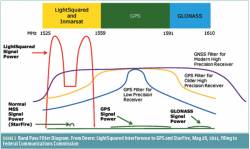Phil Falcone’s Harbinger Capital is seeking $2 billion in damages for "massive fraud" alleging that Apollo Global Management and others sold it on a plan to launch a terrestrial broadband network while concealing test results showing the network would cause crippling GPS interference and be unlikely to be approved. Assertions
in the lawsuit about those tests, the impact of the interference to GPS and an indirect admission about the difficulty of meeting the standards normally used to assess GPS interference may have implications for Ligado Networks, the current holder of the frequencies.
Harbinger is suing the previous owners and directors of SkyTerra, a firm in which it invested and then acquired in 2010. The firm, renamed LightSquared after the acquisition, attempted to recast its licensed satellite frequencies to support a high-powered, 4G network with some 40,000 Ancillary Terrestrial Components (ATCs) — that is 40,000 ground towers. Falcone’s hedge fund spent hundreds of millions of dollars securing other spectrum and developing the network before the Federal Communications Commission (FCC) put the project on indefinite hold due to wide-ranging interference to GPS receivers, which used neighboring frequencies. The firm filed bankruptcy and reorganized, emerging in 2015 with a new plan and, shortly thereafter, a new name — Ligado. Though its influence was greatly diminished, Harbinger retained an ownership interest in the new company.
The suit asserts the defendants — Apollo Global Management, Apollo Investment Fund and a number of other firms and company directors — learned about the interference problem in 2001 through its own private tests that showed the voice and data signals would overload GPS receivers.
"This overload issue," Harbinger wrote, "would effectively cripple receivers used by GPS and would be fatal to the millions of GPS devices already in use, many of which are critical to the national infrastructure and already widely used for aviation, safety, defense, and research purposes across the country."
A second set of tests done by DIRECTV in 2007 confirmed the findings. DIRECTV was considering buying SkyTerra but declined to do so based on the tests’ findings, the complaint says, and SkyTerra knew about the results.
“We believe the suit lacks merit," said a spokesperson for Apollo Global Management in a written statement, "and we intend to defend ourselves vigorously.”
Impact on Ligado
Harbinger made clear the lawsuit "has nothing to do with Ligado and its ability to execute its current business plan of deploying a modified version of a mobile terrestrial network." The complaint also said Falcone’s firm is not seeking damages from Ligado.
However, the assertions in the complaint could raise questions about the firms’ ongoing plans for the spectrum. Ligado is still pursuing a terrestrial network though it has abandoned the most troubling set of frequencies and lowered the network’s power in order to win FCC approval for a license modification.
"I think if the allegations made that the original license was based on fraudulent conduct, and the FCC decides to look into that issue, then it will be very hard, while that was ongoing, for them to grant a modification to the license," said Tim Farrar, a technology consultant specializing in the satellite industry who has followed Ligado closely.
Inside GNSS reached out to Ligado for their perspective but they did not respond to the request for comment.
In its description of the settlement with the GPS companies sued by LightSquared, Harbinger also indirectly refers to an important, ongoing fight over the standard by which GPS interference is judged — admitting it could be too difficult to meet.
The GPS community supports the internationally accepted standard that uses degradation in C/N0, the ratio between the carrier power of the signal and noise power density. This standard incorporates a safety margin to support receiver reliability. Ligado favors an interference standard based on position error — arguing that is more appropriate.
In the complaint, however, in a reference to Ligado, Harbinger criticized the fact that the GPS firms were allowed, under their settlements, to advocate "for a standard that would be difficult or impossible for the Company to meet."
The timing of the complaint from Harbinger, a key player, raises a much broader issue about Ligado’s prospects, Farrar suggested.
"You have to ask why Harbinger is filing this complaint at this point in time," he said, "because it does raise all these issues. And if Ligado was happily proceeding along to get FCC approval for its modification in the near future, as they’ve suggested, then why would Harbinger, which still has a major stake in this business, want to upset the apple cart?
"To me," Farrar, said," the only logical explanation is that they don’t believe that there is a clear path to gaining approval from the FCC in the near future for the current license modification."






